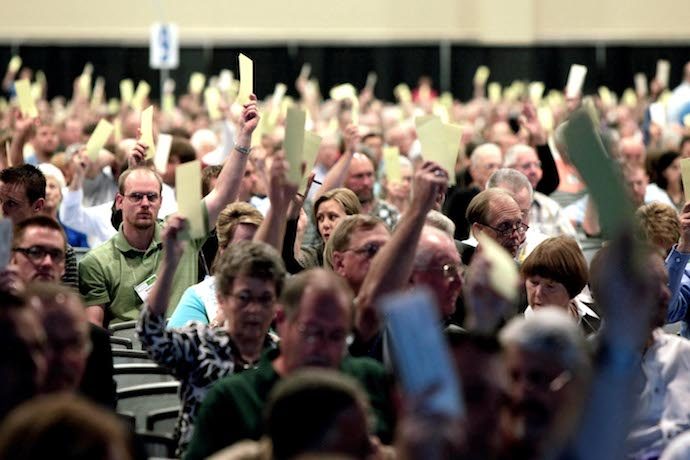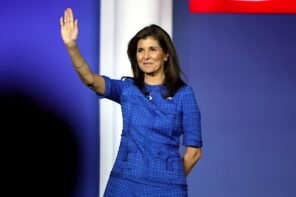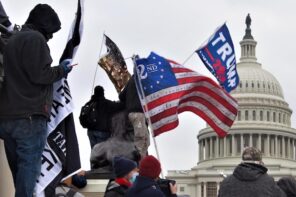When the Southern Baptist Convention’s annual meeting “went off the rails” last month following the voting body’s initial refusal to take up a resolution condemning white supremacy and the alt-right, the conservative denomination’s leadership was quick to claim that the issue was semantics, not any reluctance to condemn racism. But the language of the resolution that did pass (by a nearly unanimous vote) belies a crucial misunderstanding of what racism actually is and who, in America, bears the brunt of its violent ideology.
The resolution that ultimately passed differed sharply from the original, drafted by Texas pastor Dwight McKissic. Notably, the final resolution abandoned McKissic’s reference to the Biblical Curse of Ham, which has been used by the SBC and others to justify slavery and racial segregation, and his supporting paragraphs highlighting the rise of the “alt-right” and anti-black racism in the upper echelons of American politics and society.
The final resolution also fails to directly address anti-black racism, instead repudiating “white supremacy and every form of racial and ethnic hatred as of the devil.” While this is indeed a pointed condemnation, it suggests that white supremacy is as ubiquitous and dangerous as “all forms of racial and ethnic hatred.” This language could be construed as a value-neutral attempt to condemn all race-based bigotry, no matter who it comes from, but a resolution that condemns “all forms of racial and ethnic hatred” doesn’t actually condemn racism.
While white evangelicals (who comprise 85 percent of the SBC’s member-base according to Pew) in particular have a deep-rooted persecution complex, they do not suffer from the pervasive, institutionalized oppression that exerts itself on people of color in America, and specifically on black Americans. Considering that the SBC’s resolution name-checks the fact that “non-Anglo” (read: black) congregations are the fastest-growing segment of the declining denomination, this failure to name and condemn the violent, state-sponsored systems that continue to kill black men, (pregnant) black women, and black children with impunity, is spiritual malpractice.
Such a clear statement of condemnation (let alone any action to address the physical and spiritual violence people of color continue to experience) continues to elude the SBC. This difficulty can, in part, be attributed to the denomination’s bottom-up structure; the central governance of the SBC itself does not dictate policy, or even specific doctrine, for any individual church. But there’s also a telling lack of initiative on the part of senior SBC leadership to address these tensions in a meaningful way. With the exception of Russell Moore, the outspoken anti-Trump president of SBC’s Ethics and Religious Liberty Commission (ERLC), senior leadership continues to offer little more than overtures (or non-binding resolutions) to congregants of color who are seeking racial reconciliation within their denomination.
That failure is one reason, among many, that some Southern Baptists of color, specifically black Southern Baptists, are questioning their formal affiliation in a denomination that apparently struggles to state, unequivocally, that Black Lives Matter. As lifelong Southern Baptist Lawrence Ware powerfully explained in his New York Times op-ed Monday, despite SBC resolutions heralding racial reconciliation as far back as 1995:
not enough has been done to address the institutional nature of white supremacy in the convention. Many churches are still hostile to the Black Lives Matter movement, and even more were silent during the rise of Mr. Trump and the so-called alt-right. For all of its talk about the love of Jesus Christ, the Southern Baptist Convention’s inaction on the issues of racism and homophobia has drowned out its words.
The decentralized nature of the SBC does not absolve its overwhelmingly white leaders of responsibility for the pastoral care of the thousands of Americans whose offerings the organization collects. The same leadership bodies that claimed ignorance about the alt-right while nit-picking the diction of a resolution offered by a prominent black pastor have also trumpeted their own progressive prowess in passing resolutions regarding racial reconciliation in 2015, and expressing “sensitivity and unity” regarding the Confederate battle flag in 2016. SBC leadership can’t have it both ways—they can’t fall back on critique of parliamentary rules when called out for dismissing a timely, heartfelt resolution from a messenger directly impacted by anti-Black racism, while simultaneously touting their supposedly visionary leadership on racial reconciliation.
All this belies a massive blind spot within the institutional SBC when it comes to hearing and responding to the harm that racism writ large, and within SBC churches, does to people of color. As Kyle James Howard wrote in a blog post republished on SBC Voices, black members do see their denomination making modest efforts to address the tradition’s racist background, but…
…they also see their Convention fail to make a clear and definitive statement against the evil of racism without significant backlash pushing them to do so. They see an African American brother make a passionate plea to the Convention to act but his resolution rejected because of word choice and writing style. They see a resolution committee willing to take the time to craft benign statements about things people already know we believe, reworking other resolutions to make them palatable, while ignoring and being unwilling to act on an issue of vital importance to the minority community. They see a committee and then Convention of messengers who hesitates when the question of race comes up and not ready and willing to be bold and name evil where it exists.
Meanwhile, the rank-and-file congregants and pastors who post on sites like SBC’s “unofficial source for news and opinion,” SBC Voices, continue to engage in false equivalencies suggesting that Black Lives Matter, the Nation of Islam, and the so-called “alt-left” are just as racist as the alt-right, and require a similarly “explicit” condemnation from SBC leadership. The pushback on these claims is notably less sustained and less voluminous than the apologetics that appear whenever a member asks his denomination to address anti-black sentiment within the church.
It doesn’t take much digging to uncover the questionable roots of this “All Lives Matter” approach to condemning “racial bias” in the SBC. An active thread discussing “Southern Baptists and the Alt-Right” on SBC Voices features a cacophony of white people (including high-profile white pastors affiliated with SBC) claiming that the true racial scourge in America is “skin color supremacy.” If that phrase sounds odd, it should. Academic literature featuring that phrase is nearly non-existent, save for discussions of colorism that generally refer to hierarchies constructed within communities of color that tend to privilege black and brown people with less melanin in their skin, and hence greater “passing privilege” as white.
Indeed, it’s the epitome of white privilege to think that a broad, non-binding resolution against “racism in all its forms” could possibly begin to heal the wounds inflicted by the systemic, violent oppression of people of color since the first settlers colonized this land. Claiming an opposition to “skin color supremacy” pointedly erases the role white people, white supremacy, and Christian ideology (not to mention evangelicalism) have played in centuries of mass murder, subjugation, and cultural genocide inflicted on people who do not fit whatever is determined at the moment to be the contemporary standard of acceptable whiteness.
Nevertheless, there are some pastors leading their SBC-affiliated congregations toward meaningful racial reconciliation. But with just two exceptions, those individuals don’t hold leadership positions within the SBC. We spoke with Walter R. Strickland, a theology professor and associate vice president for Kingdom Diversity Initiatives at Southeastern Baptist Theological Seminary, and one of the only black members of SBC’s current denominational leadership. During the annual convention, the 33-year-old pastor and professor from Raleigh, N.C., was confirmed as First Vice President of the SBC. He is the second black man to ever hold such an elevated position in SBC’s denominational ranks, according to Faithfully Magazine.
While Strickland, a lifelong Southern Baptist, insists that he’s seen movement toward inclusion and diversity within the denomination over the past decade, he acknowledged that the vast majority of the labor surrounding racial reconciliation is being performed by black people. The controversy at the annual convention helped open some members’ eyes to the reality that it will take more than a resolution and a general welcoming posture to truly bridge the divide.
“[SBC members are starting to say] ‘We have to begin to strategically move and make decisions to begin to demonstrate that our doors are open,’” Strickland said.
But who’s actually making those strategic moves? Strickland named a handful of pastors who have started to explore racial reconciliation in their congregations; most of those pastors lead churches located in the South, and all them are African American. Strickland added that he’ll be speaking at the LifeWay Black Church leadership conference in North Carolina this month, “talking about this very thing—trying to figure out how to mobilize our African-American churches in SBC to be a part of this [work].”
But Strickland isn’t naive about the steep uphill battle he and his colleagues face in dragging the SBC toward racial reconciliation. “There are churches and leaders rising up to see that there’s something going on [with the SBC],” Strickland said. “Yes, there are structural biases that need to be dealt with, but dealing with those structural biases, versus building up a whole new thing… is a shorter runway for people being actually helped with church planting, international missions, theological education, and the like.”
Long story short, Strickland said, “it’s a matter of expediency, but not pragmatism. … The possibilities are here, but we need to just make them realities—which will take some work, and some heartache as well.”
It remains to be seen—though it’s not hard to guess—whose hearts will be aching most acutely during that process.





